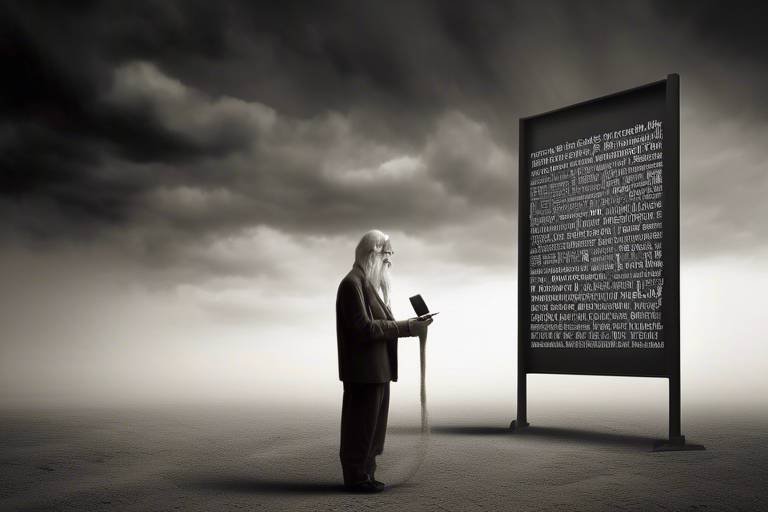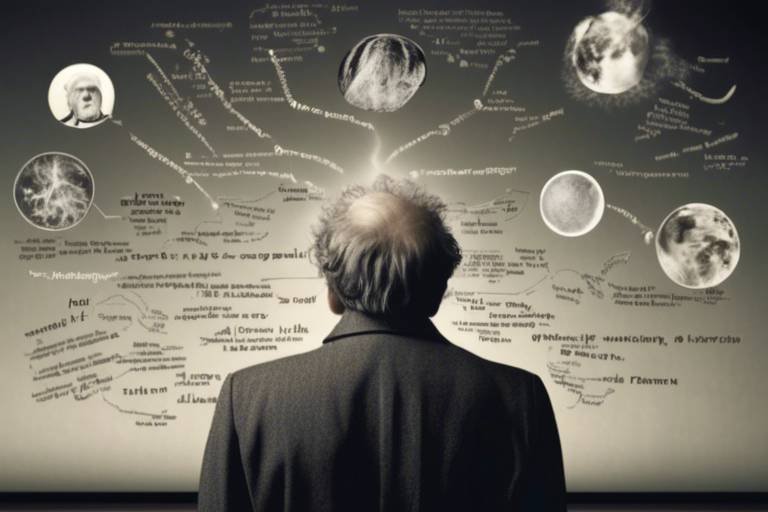The Ultimate Reality - A Philosophical Perspective
Welcome to the fascinating journey of exploring ultimate reality! This concept, often cloaked in mystery and abstract thought, invites us to ponder the very essence of existence. What does it mean to say something is real? Is reality a shared experience, or is it uniquely perceived by each individual? These questions have intrigued philosophers for centuries, leading to rich discussions that shape our understanding of the universe and our place within it.
At its core, ultimate reality seeks to answer profound questions about existence, knowledge, and the human experience. It challenges us to look beyond the surface of our daily lives and consider the underlying truths that govern our perceptions and beliefs. As we delve into various philosophical interpretations, we will uncover how different schools of thought approach this enigmatic subject, each offering unique insights that can profoundly influence our understanding of life itself.
Ultimate reality refers to the fundamental nature of existence and the universe. It encompasses everything that is, whether we can perceive it or not. In philosophy, understanding ultimate reality is crucial because it shapes how we comprehend our surroundings and our very being. Think of it as the foundation of a house; without a solid base, the structure cannot stand. This concept is significant because it influences our beliefs, values, and actions.
Many philosophers argue that our understanding of ultimate reality is not just academic; it has real implications for how we live our lives. For instance, if one believes in a materialistic view of reality, they may prioritize physical possessions and achievements. Conversely, someone who subscribes to a spiritual or idealistic perspective may focus on inner growth and connections with others. In this way, our understanding of ultimate reality can dictate our choices and the meaning we derive from life.
Various philosophical schools have tackled the question of ultimate reality, each offering distinct perspectives that enrich our understanding of existence. Here are some of the major schools that have made significant contributions to this discourse:
- Realism: Asserts that reality exists independently of our perceptions.
- Idealism: Suggests that reality is fundamentally mental or spiritual.
- Existentialism: Focuses on individual experience and the construction of personal reality.
Realism posits that an objective reality exists, independent of human thoughts and beliefs. This perspective is crucial in understanding how we acquire knowledge and truth. Imagine a world where the sun rises and sets regardless of whether anyone is there to witness it. This idea emphasizes that reality does not rely on our perceptions; it simply is.
Scientific realism is a branch of realism that asserts the existence of an objective reality that science aims to uncover. Through empirical evidence and observation, scientists strive to reveal the truths of our universe. For example, when we observe the laws of physics, we are not merely observing our thoughts but engaging with a reality that exists beyond our understanding. This pursuit of knowledge is akin to peeling back the layers of an onion, revealing deeper truths with each layer removed.
On the other hand, metaphysical realism argues for a reality that extends beyond the physical world. This perspective raises questions about existence, universals, and the nature of being. It challenges us to consider what lies beyond our immediate perceptions and how these unseen elements influence our understanding of reality.
In contrast, idealism posits that reality is fundamentally shaped by our perceptions and mental constructs. This viewpoint suggests that our understanding of the world is intricately tied to our thoughts and experiences. Imagine reality as a canvas, where each person's experiences and perceptions paint a unique picture. This perspective emphasizes the role of consciousness in shaping our understanding of existence.
Existentialism brings a different flavor to the discussion, focusing on individual experience and choice. It posits that our personal reality is constructed through our decisions and actions. This school of thought resonates with the idea that "existence precedes essence," meaning that individuals define their own meaning and purpose in life through their choices.
This principle highlights the importance of individual agency in shaping one's reality. Rather than being defined by predetermined roles or societal expectations, existentialists argue that we have the power to create our essence through our actions. It’s like being an artist of your own life, where every decision contributes to your unique masterpiece.
Lastly, the concept of the absurd plays a crucial role in existentialist thought. It confronts the inherent meaninglessness of life, prompting individuals to seek their own meaning in a chaotic universe. This struggle against the absurd can lead to a deeper understanding of ultimate reality, as individuals grapple with their existence and the choices they make.
What is ultimate reality?
Ultimate reality refers to the fundamental nature of existence, encompassing everything that is, whether perceived or not.
How do different philosophical schools interpret ultimate reality?
Different schools, such as realism, idealism, and existentialism, offer unique perspectives on ultimate reality, influencing how we understand existence and knowledge.
Why is understanding ultimate reality important?
Understanding ultimate reality shapes our beliefs, values, and actions, influencing the meaning we derive from life and our choices.

Understanding Ultimate Reality
The concept of ultimate reality is one of the most profound and intriguing topics in philosophy. It refers to the fundamental nature of reality, the essence of existence, and what it truly means to be. This idea has captivated thinkers for centuries, pushing them to explore the very fabric of life and the universe. In simple terms, ultimate reality is the underlying truth that governs all that we perceive and experience. But what does this really mean for us as human beings?
To grasp the significance of ultimate reality, we must first recognize how it influences our understanding of existence. Imagine standing in front of a vast ocean; the water represents the myriad experiences and perceptions we encounter daily. However, beneath the surface, there exists a deeper current—this is the ultimate reality that shapes everything we see. It is the foundation upon which our beliefs, values, and understanding of the universe are built.
The exploration of ultimate reality isn't just an academic exercise; it has practical implications for how we live our lives. Our perceptions of reality can shape our actions, decisions, and interactions with others. For instance, if one believes that reality is purely materialistic, they may prioritize wealth and possessions. On the other hand, a person who sees reality as interconnected and spiritual may focus on relationships and personal growth. Thus, the way we interpret ultimate reality can significantly influence our life choices.
Furthermore, the quest to understand ultimate reality often leads us to ask some of life's most challenging questions:
- What is the nature of existence?
- Is there a greater purpose to life?
- How do we know what we know?
Ultimately, understanding ultimate reality is about seeking truth—an endeavor that transcends time and culture. Philosophers across ages have contributed to this dialogue, offering various interpretations that reflect their unique contexts. Whether through the lens of science, spirituality, or existential inquiry, the pursuit of ultimate reality invites us to explore the unknown and embrace the mysteries of existence.
In summary, the exploration of ultimate reality is not merely an abstract philosophical concept; it is a journey that shapes our understanding of ourselves and the world around us. By engaging with this idea, we can gain insights into our existence and the intricate web of life that connects us all. So, what is your perception of ultimate reality? How does it influence your beliefs and choices in life?

Philosophical Schools of Thought
When we dive into the depths of philosophical inquiry, we uncover a rich tapestry of thoughts and beliefs that have shaped our understanding of ultimate reality. Each philosophical school offers a unique lens through which we can perceive existence, knowledge, and the universe. At the heart of this exploration are three major schools of thought: realism, idealism, and existentialism. Each of these perspectives not only provides a distinct interpretation of reality but also influences how we engage with the world around us.
Realism, for instance, asserts that reality exists independently of our perceptions. It posits that there is an objective world out there, waiting to be discovered, much like a treasure chest hidden beneath the ocean's surface. This school of thought emphasizes the importance of empirical evidence and observation in understanding the nature of existence. In contrast, idealism argues that reality is fundamentally mental or spiritual, suggesting that our perceptions shape our understanding of the world. This perspective can be likened to viewing reality through a kaleidoscope, where the colors and patterns shift based on our mental state and experiences.
Existentialism, on the other hand, focuses on individual experience and choice, emphasizing that personal reality is constructed through our actions and decisions. This school challenges us to confront the essence of our existence, urging us to take responsibility for creating meaning in our lives. It’s a bit like being the author of your own story, where each choice leads to a new chapter filled with possibilities.
To further illustrate the differences among these schools, let’s take a look at a comparative table:
| Philosophical School | Core Beliefs | Implications for Reality |
|---|---|---|
| Realism | Reality exists independently of perception. | Knowledge is based on objective truths. |
| Idealism | Reality is shaped by mental constructs. | Perception is key to understanding existence. |
| Existentialism | Individual experience and choice define reality. | Meaning is created through personal actions. |
These schools of thought not only enrich our philosophical understanding but also challenge us to reflect on our own beliefs about existence. By examining these perspectives, we can gain insight into the complexities of human experience and the nature of ultimate reality. So, which school resonates with you? Are you more inclined to believe in an objective reality, or do you find comfort in the idea that your perceptions shape your world? The beauty of philosophy lies in its ability to provoke thought and inspire dialogue, inviting us to explore the myriad ways we understand our existence.
- What is ultimate reality? Ultimate reality refers to the fundamental nature of existence and the universe, often explored through various philosophical lenses.
- How do different philosophical schools interpret reality? Each school, such as realism, idealism, and existentialism, offers distinct interpretations based on their foundational beliefs about existence and consciousness.
- Why is understanding philosophical perspectives important? Understanding these perspectives helps us navigate our own beliefs about existence, knowledge, and the human experience, enriching our worldview.

Realism and Its Implications
Realism is a philosophical stance that asserts the existence of an objective reality, independent of human perception or belief. Imagine walking into a room full of vibrant colors, distinct shapes, and tangible objects. Whether you acknowledge their existence or not, they exist in their own right. This notion challenges us to consider the implications of a reality that is not merely a figment of our imagination but rather a world that exists outside of our subjective experiences. The essence of realism lies in its assertion that truth and knowledge are grounded in this external reality, making it a cornerstone of many philosophical discussions.
One of the most significant implications of realism is its impact on our understanding of knowledge. If reality exists independently, then our perceptions and beliefs must align with this reality to be considered true. This leads to a rigorous quest for knowledge, where empirical evidence and observation become paramount. For instance, scientific realism posits that the universe operates according to laws that can be discovered through observation and experimentation. This perspective fosters a sense of confidence in the scientific method, encouraging us to seek out truths that are verifiable and replicable.
Moreover, realism raises critical questions about the nature of existence itself. Are our thoughts and perceptions merely reflections of a deeper reality, or do they hold intrinsic value? Metaphysical realism, for instance, delves into these questions by arguing for the existence of entities beyond physical observation, such as abstract concepts and universals. This perspective invites us to consider the existence of moral truths or mathematical entities that may not be directly observable but are nonetheless real in their implications.
In contrast to idealism, which suggests that reality is shaped by our perceptions, realism asserts that our understanding of the world must be grounded in its objective nature. This dichotomy leads to fascinating discussions about consciousness and existence. For example, consider the philosophical debate surrounding the existence of the external world. Realists argue that the world exists regardless of our perception, while idealists contend that our understanding of reality is inherently subjective.
To illustrate the implications of realism further, let’s look at a simplified comparison of realism and idealism:
| Aspect | Realism | Idealism |
|---|---|---|
| Nature of Reality | Objective and independent | Subjective and mental |
| Source of Knowledge | Empirical observation | Intuition and perception |
| Existence of Objects | Exist regardless of observation | Exist only through perception |
Ultimately, realism invites us to confront the world as it is, challenging us to engage with the complexities of existence and knowledge. It emphasizes the importance of grounding our beliefs in reality, fostering a robust dialogue about what it means to know something truly. As we navigate through life, the principles of realism can serve as a guiding framework, encouraging us to seek truth in a world that often feels chaotic and uncertain.
In conclusion, realism not only shapes our understanding of the universe but also influences our approach to knowledge and existence. By embracing this philosophical stance, we are encouraged to look beyond our subjective experiences and engage with the world in a more profound and meaningful way. So, the next time you ponder the nature of reality, remember that there is a whole universe out there, waiting to be explored, understood, and appreciated.
- What is realism in philosophy?
Realism is the belief that reality exists independently of our perceptions or beliefs. It posits that truth and knowledge are grounded in an objective reality. - How does realism differ from idealism?
While realism asserts that reality is objective and exists independently, idealism suggests that reality is shaped by our perceptions and thoughts. - What are the implications of realism for knowledge?
Realism emphasizes the importance of empirical evidence and observation in the pursuit of knowledge, suggesting that our beliefs must align with an objective reality to be considered true. - What is scientific realism?
Scientific realism is a subset of realism that asserts the existence of an objective reality that science aims to uncover through empirical methods and observation.

Scientific Realism
Scientific realism is a fascinating and critical perspective within the broader philosophical discourse on ultimate reality. At its core, this philosophy asserts that there exists an objective reality that is independent of our perceptions and beliefs. In simpler terms, it suggests that the world around us, including the laws of nature and fundamental truths, exists regardless of whether we are there to observe it or understand it. This idea can be likened to a hidden treasure chest buried deep in the earth; it exists with or without our knowledge of its existence. The role of science, then, becomes that of an explorer, seeking to uncover and understand what lies within that chest through rigorous investigation and empirical evidence.
One of the most compelling aspects of scientific realism is its commitment to the idea that scientific theories are not just useful tools for prediction but are also true descriptions of the world. When scientists propose a theory, such as the theory of gravity or evolution, they are not merely crafting models that work under certain conditions; they are positing a reality that reflects the underlying structure of the universe. This belief is crucial because it implies that science is not just about observing phenomena but also about discovering the truths that govern those phenomena. In this way, scientific realism bridges the gap between our subjective experiences and the objective world, providing a framework for understanding how we relate to the universe.
However, the implications of scientific realism extend beyond just the relationship between science and reality. It raises profound questions about knowledge and truth. If we accept that there is an objective reality out there, we must also grapple with the idea that our perceptions and interpretations can be flawed. This means that while science strives to uncover truths, it is also susceptible to biases and limitations inherent in human cognition. For instance, historical scientific theories, once deemed accurate, have been overturned as new evidence emerged. This ongoing evolution of scientific understanding highlights a critical tension within scientific realism: the balance between confidence in our findings and the humility to acknowledge our potential errors.
To better understand scientific realism, it can be helpful to consider its relationship with other philosophical perspectives. Below is a brief comparison:
| Philosophical Perspective | Key Belief | Example |
|---|---|---|
| Scientific Realism | Objective reality exists independently of our perceptions. | The existence of atoms, regardless of our ability to see them. |
| Instrumentalism | Scientific theories are merely tools for prediction. | Viewing theories as useful fictions rather than true descriptions. |
| Constructivism | Knowledge is constructed through social processes. | Understanding scientific knowledge as influenced by cultural context. |
In conclusion, scientific realism plays a pivotal role in shaping our understanding of ultimate reality. It challenges us to consider the nature of existence, knowledge, and truth while emphasizing the importance of empirical evidence in our quest for understanding. As we navigate through the complexities of the universe, scientific realism serves as a guiding principle, reminding us that while our perceptions may be limited, the objective reality we seek is worth exploring. This exploration not only enriches our knowledge but also deepens our connection to the world around us, inviting us to continually question and expand our understanding of existence.
- What is scientific realism? Scientific realism is the philosophical view that the world described by science is real and exists independently of our observations.
- How does scientific realism differ from instrumentalism? Unlike instrumentalism, which views scientific theories as mere tools for prediction, scientific realism asserts that these theories describe an objective reality.
- What are the implications of scientific realism for knowledge? It suggests that while we strive for knowledge through scientific inquiry, our understanding is always subject to revision as new evidence emerges.

Metaphysical Realism
Metaphysical realism is a fascinating philosophical stance that asserts the existence of a reality that transcends our immediate perceptions and experiences. Imagine standing at the edge of a vast ocean; while you can only see the waves crashing on the shore, metaphysical realism argues that there is a whole underwater world filled with life and complexity that remains unseen. This perspective challenges us to consider the nature of existence itself and pushes the boundaries of our understanding of what is real.
At its core, metaphysical realism posits that the world exists independently of our thoughts or beliefs about it. This means that objects, properties, and events exist in a manner that is not contingent upon human consciousness. For instance, a tree remains a tree whether or not anyone is there to observe it. This notion aligns with the idea that there are truths about the world that are objective and can be discovered through rigorous inquiry and analysis.
One of the significant implications of metaphysical realism is its influence on various fields of study, including science, ethics, and epistemology. In science, for example, metaphysical realism supports the idea that scientific theories aim to accurately describe an objective reality. This leads to the belief that through empirical evidence and observation, we can uncover truths about the universe that exist regardless of our subjective experiences. In contrast, if we were to adopt a more subjective view, we might argue that reality is merely a construct of our perceptions, leading to a more relativistic approach to knowledge.
Furthermore, metaphysical realism invites us to consider the existence of universals—abstract entities that can exist independently of particular instances. For example, the concept of "redness" exists as a property that can be instantiated in many different objects, such as apples, fire trucks, or roses. This idea raises intriguing questions about the nature of being and the relationship between the abstract and the concrete. Are these universals real in the same way that physical objects are? Metaphysical realism suggests they are, which opens up a rich field of philosophical inquiry.
However, metaphysical realism is not without its challenges. Critics argue that our understanding of reality is always mediated by our senses and cognitive frameworks, making it impossible to truly know an objective reality. This leads to a philosophical debate between realists and anti-realists, with each side presenting compelling arguments. While realists maintain that there is a reality that exists independently of our perceptions, anti-realists argue that our experiences shape our understanding of what is real.
In summary, metaphysical realism provides a robust framework for exploring the nature of reality beyond our immediate perceptions. It challenges us to acknowledge the existence of an objective world that is rich with complexities waiting to be discovered. As we navigate through life, understanding this philosophical stance can deepen our appreciation for the mysteries of existence and the pursuit of knowledge.
- What is metaphysical realism?
Metaphysical realism is the belief that reality exists independently of our perceptions and thoughts. It posits that there are objective truths about the world that can be discovered. - How does metaphysical realism differ from other philosophical perspectives?
Unlike idealism, which suggests that reality is fundamentally mental or spiritual, metaphysical realism asserts that there is a physical reality that exists regardless of our consciousness. - What are the implications of metaphysical realism in science?
Metaphysical realism supports the idea that scientific theories aim to describe an objective reality, leading to the belief that empirical evidence can uncover truths about the universe. - Are universals real according to metaphysical realism?
Yes, metaphysical realism posits that universals, such as properties and concepts, exist independently of particular instances, contributing to our understanding of reality.

Idealism and Perception
When we dive into the world of idealism, we find ourselves navigating a philosophical landscape where reality is not merely a backdrop for our lives, but a canvas painted by our perceptions and thoughts. Imagine reality as a movie, and we are the directors, shaping the script with our beliefs and experiences. In this view, the essence of existence hinges on our mental constructs rather than an objective material world. This perspective raises intriguing questions: What if our understanding of reality is just a reflection of our minds? Could it be that the universe is a grand illusion, crafted by our consciousness?
At its core, idealism asserts that the material world is secondary to the mental realm. This notion challenges the conventional view of reality as something that exists independently of our awareness. Instead, it posits that our perceptions are the primary means through which we engage with the world around us. For instance, consider how two people can witness the same event yet interpret it entirely differently based on their backgrounds, emotions, and thoughts. This variability highlights the idea that our understanding of reality is, in many ways, a subjective experience.
One of the fascinating implications of idealism is its impact on knowledge and existence. If reality is shaped by our perceptions, then knowledge becomes a deeply personal journey. Each individual constructs their own version of reality, influenced by their unique experiences and cognitive frameworks. This leads us to ponder the nature of truth: Is there a universal truth, or is truth merely a collection of individual perspectives? To illustrate this, let’s consider a table that contrasts idealism with other philosophical views:
| Philosophical View | Core Belief | Implications for Reality |
|---|---|---|
| Idealism | Reality is fundamentally mental or spiritual. | Perception shapes reality; truth is subjective. |
| Realism | Reality exists independently of our perceptions. | Truth is objective and can be discovered. |
| Existentialism | Individuals create their own meaning and reality. | Reality is shaped by personal choices and experiences. |
This table succinctly illustrates how idealism diverges from realism and existentialism, emphasizing the role of perception in constructing our understanding of reality. In a world where everything is filtered through our consciousness, the implications for knowledge are profound. We must ask ourselves: How do our beliefs shape our perceptions? And conversely, how do our perceptions influence our beliefs? This interplay between perception and belief is at the heart of idealist philosophy.
In summary, idealism invites us to reconsider our approach to reality. It suggests that the world we inhabit is not a fixed entity but a fluid tapestry woven from our thoughts, feelings, and perceptions. This perspective not only challenges traditional notions of existence but also empowers individuals to take an active role in shaping their own realities. So, the next time you ponder the nature of existence, remember: you are not just an observer; you are a co-creator of the reality you experience.
- What is idealism? Idealism is a philosophical perspective that asserts that reality is fundamentally mental or spiritual, emphasizing the role of perception in shaping our understanding of existence.
- How does idealism differ from realism? While idealism posits that reality is shaped by our perceptions, realism asserts that an objective reality exists independently of our awareness.
- What are the implications of idealism for knowledge? Idealism suggests that knowledge is subjective and personal, as each individual constructs their own version of reality based on their experiences and beliefs.
- Can idealism coexist with other philosophical views? Yes, many people find value in integrating aspects of idealism with realism and existentialism, creating a more nuanced understanding of reality.

Existentialism and Human Experience
Existentialism is a philosophical movement that dives deep into the waters of human experience, emphasizing the individual's journey through life. At its core, existentialism is about personal choice and the struggle to find meaning in a world that often seems indifferent or chaotic. Have you ever found yourself questioning your purpose, wondering if your choices truly matter? This is where existentialism shines, illuminating the path of self-discovery and individual agency.
One of the foundational ideas of existentialism is that we are not born with a predetermined essence. Instead, existence precedes essence. This means that individuals create their own identities and meanings through their actions and decisions. Think of it like being an artist with a blank canvas; your life is your artwork, and you wield the brush. Each stroke represents a choice, a moment of freedom that shapes who you are. This perspective encourages people to embrace their freedom and take responsibility for their lives.
Moreover, existentialists grapple with the concept of the absurd, which refers to the conflict between the human desire for meaning and the silent universe that offers none. This absurdity can be both liberating and daunting. On one hand, it frees us from the constraints of imposed meanings; on the other, it confronts us with the reality of our own insignificance. How do we find purpose in a world that seems to lack inherent meaning? This question is central to existential thought, pushing individuals to confront their fears and uncertainties.
In existentialism, the process of constructing personal reality is not merely an intellectual exercise; it's an emotional and often tumultuous journey. Life's experiences, choices, and even failures play a crucial role in shaping one's understanding of ultimate reality. For instance, consider the following aspects:
- Authenticity: Living authentically means being true to oneself, making choices that reflect one's values and beliefs, rather than conforming to societal expectations.
- Isolation: Existentialists often emphasize the feeling of isolation in a vast, indifferent universe, which can lead to profound insights about individual existence.
- Freedom and Responsibility: With freedom comes responsibility. Each choice carries weight, and existentialists argue that we must own our decisions and their consequences.
Ultimately, existentialism invites us to engage with our existence on a deeply personal level. It challenges us to ask hard questions and to seek our own answers. This philosophy does not provide easy solutions; instead, it encourages a journey filled with exploration and introspection. Through this lens, we can better understand our place in the universe and the nature of ultimate reality.
What is existentialism?
Existentialism is a philosophical movement that emphasizes individual existence, freedom, and choice, focusing on the subjective experience of being human.
How does existentialism address meaning in life?
Existentialism posits that life has no inherent meaning, and it is up to each individual to create their own purpose through their choices and actions.
What does "existence precedes essence" mean?
This phrase suggests that individuals are not born with a predetermined purpose or identity; instead, they define themselves through their experiences and choices.
How does existentialism relate to the concept of the absurd?
The absurd refers to the conflict between our search for meaning and the universe's indifference. Existentialists believe that acknowledging this absurdity can lead to personal freedom and authenticity.

Existence Precedes Essence
When we dive into the philosophical waters of existentialism, one of the most profound principles we encounter is the idea that . This concept, championed by philosophers like Jean-Paul Sartre, flips the traditional view of existence on its head. Traditionally, many believed that essence—our purpose or nature—comes first, shaping our existence. However, existentialists argue that we first exist, and through our choices and actions, we define our essence. It's like being handed a blank canvas; you’re not just a painting waiting to be created; instead, you are the artist of your own life, free to splash color in any way you choose.
This notion challenges us to confront our own agency in a world that often feels predetermined. Imagine standing in front of a vast sea of possibilities. Each wave represents a choice, and the shore is your essence, shaped not by the waves themselves but by how you choose to navigate them. This perspective encourages a sense of responsibility; we are not mere puppets in a play written by fate, but rather, we are the playwrights, crafting our own narratives. It's both exhilarating and daunting, isn't it?
Furthermore, this principle has profound implications for how we understand meaning in life. If we accept that existence precedes essence, then meaning is not something that is given to us; it is something we must actively create. This can lead to a sense of empowerment, as we realize that we have the ability to shape our lives according to our values and beliefs. However, it can also lead to feelings of anxiety, as the burden of creating meaning falls squarely on our shoulders. In this light, the existentialist journey becomes one of exploration and discovery, where we learn to embrace the uncertainty and chaos of existence.
To illustrate this point, consider the following table that summarizes the key differences between traditional views and existentialist perspectives:
| Aspect | Traditional View | Existentialist View |
|---|---|---|
| Nature of Existence | Essence defines existence | Existence defines essence |
| Meaning | Inherent and predetermined | Created through choices |
| Responsibility | External forces shape life | Individual agency and choice |
In conclusion, the idea that existence precedes essence serves as a powerful reminder of our freedom and responsibility in shaping our lives. It invites us to reflect on our choices and encourages us to live authentically, embracing the beautiful chaos of existence. So, the next time you find yourself pondering your purpose, remember: you are the creator of your essence, and your existence is just the beginning of an incredible journey.
- What does "existence precedes essence" mean? It means that individuals first exist and then define their essence through their actions and choices.
- Who is associated with this concept? Jean-Paul Sartre is a key philosopher associated with the idea of existence preceding essence.
- How does this principle affect personal responsibility? It emphasizes that individuals are responsible for creating their own meaning and essence in life.
- Can this idea lead to anxiety? Yes, because it places the burden of meaning-making on the individual, which can be daunting.

The Absurd and Ultimate Reality
The concept of the absurd is a profound philosophical notion that challenges our understanding of ultimate reality. It stems from the idea that life, in its essence, is filled with contradictions and a lack of inherent meaning. Think of it like navigating through a maze without a map; you know there are walls, turns, and dead ends, but the ultimate destination remains elusive. This absurdity is not just a philosophical curiosity; it has real implications for how we perceive existence and our place within it.
Existentialists, notably figures like Albert Camus, argue that recognizing the absurdity of life is the first step towards freedom. By confronting the idea that life lacks inherent meaning, individuals are empowered to create their own purpose. This perspective can be liberating. Just as an artist takes a blank canvas and creates a masterpiece, we too can shape our lives and define our reality amidst chaos. The absurd invites us to embrace the uncertainties and contradictions of existence, rather than shy away from them.
In grappling with the absurd, one might ask: How does this understanding alter our perception of ultimate reality? The answer lies in the relationship between individual experience and the broader universe. The absurd teaches us that while we may seek objective truths, much of our reality is subjective and colored by personal experiences. For example, consider two people standing on a beach, gazing at the ocean. One sees beauty and tranquility, while the other feels insignificance and despair. Both interpretations are valid, highlighting how our perceptions shape our understanding of reality.
Furthermore, the absurdity of life compels us to ask deeper questions about existence. It challenges us to confront the following:
- What does it mean to live authentically in a world devoid of inherent meaning?
- How do we find connection and purpose in our relationships and endeavors?
- Can we embrace the absurd and still strive for happiness and fulfillment?
Ultimately, the absurd does not lead us to nihilism; rather, it encourages a passionate engagement with life. By acknowledging the absurd, we can cultivate resilience and a sense of agency. Just like a sailor learns to navigate through storms, we too can learn to maneuver through life's uncertainties. The existentialists remind us that while we may not control the winds, we can certainly adjust our sails.
In conclusion, the absurd challenges our traditional views of ultimate reality. It pushes us to reconsider the nature of existence and our role within it. By embracing the absurd, we open ourselves to a more profound understanding of life, one that is rich with personal meaning and authenticity. After all, the journey towards understanding ultimate reality is not just about finding answers; it's about engaging with the questions that define our human experience.
- What is the absurd in philosophy? The absurd refers to the conflict between human beings' desire to find inherent meaning in life and the silent, indifferent universe that offers none.
- How do existentialists view ultimate reality? Existentialists believe that ultimate reality is shaped by individual experiences and choices, emphasizing personal agency in defining meaning.
- Can embracing the absurd lead to happiness? Yes, by acknowledging the absurd, individuals can create their own meaning and find fulfillment despite life's inherent contradictions.
Frequently Asked Questions
- What is ultimate reality?
Ultimate reality refers to the fundamental nature of existence, encompassing everything that is real, whether it is physical, mental, or spiritual. Philosophers have long debated its significance, as it shapes our understanding of the universe and our place within it.
- How do different philosophical schools interpret ultimate reality?
Various philosophical schools, like realism, idealism, and existentialism, offer distinct interpretations of ultimate reality. Realism posits that reality exists independently of our perceptions, while idealism suggests that reality is fundamentally shaped by our thoughts and perceptions. Existentialism, on the other hand, emphasizes individual experience and the subjective construction of reality.
- What is the difference between scientific realism and metaphysical realism?
Scientific realism asserts that an objective reality exists, which science aims to uncover through empirical investigation and observation. Metaphysical realism, however, argues for a reality that transcends the physical, addressing issues related to existence, universals, and the essence of being.
- How does idealism affect our understanding of reality?
Idealism posits that reality is primarily mental or spiritual, suggesting that our perceptions shape our understanding of existence. This perspective implies that what we consider 'real' is influenced by our thoughts, beliefs, and experiences, making reality a subjective experience.
- What does existentialism say about human experience?
Existentialism focuses on individual experience and the freedom of choice, asserting that individuals create their own meaning and reality. The idea that 'existence precedes essence' highlights the importance of personal agency in shaping one's life and understanding of ultimate reality.
- What is the concept of the absurd in existentialism?
The absurd refers to the inherent meaninglessness of life, a concept explored by existentialists. They confront this absurdity, recognizing that while life may lack intrinsic meaning, individuals have the power to create their own purpose and understanding of ultimate reality.


















